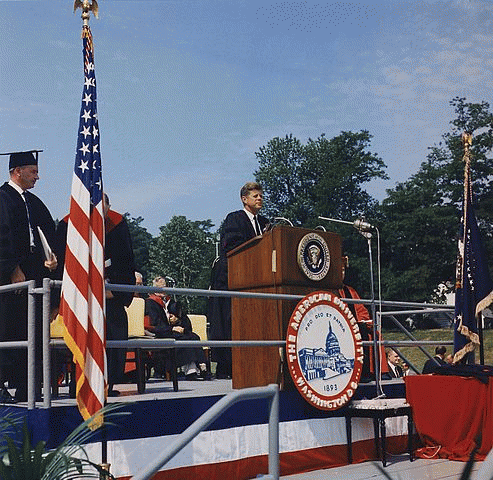
JFK American University Address - June 10, 1963
(Image by (From Wikimedia) Cecil Stoughton, Author: Cecil Stoughton) Details Source DMCA
Giving Peace a Fighting Chance
Whilst the date doubtless has come and gone for most folks, without them thinking much about it, the passing of 10 June should nonetheless have given us pause to reflect on the current state of the Republic, and the direction in which it is heading.
Though it may not have been widely recognized at the time, on that day in 1963, president John Fitzgerald Kennedy (JFK) in his American University (AU) Commencement Address delivered what is arguably the most significant oration of his ill-fated tenure. In fact, it may well have been the most pivotal in American foreign policy in that era. And it unquestionably has an important message for us all now. The following gives us an idea of what was on JFK's mind:
'I have chosen this time and place to discuss a topic on which ignorance too often abounds and the truth too rarely perceived. And that's the most important topic on earth: peace. What kind of peace do I mean and what kind of a peace do we seek? Not a Pax Americana enforced on the world by American weapons of war....Not the peace of the grave or the security of the slave. I am talking about genuine peace, the kind that enables men and nations to grow, and to hope, and build a better life for their children -- not merely peace for Americans but peace for all, not merely peace in our time but in all time.'
In this address, it seemed Kennedy was attempting to re-define the then accepted notion of Pax Americana, to articulate a more inclusive, collaborative version, one that would bring folk with them willingly rather than dragging them kicking and screaming to the position. In almost all respects this wasn't just a redefinition; he aim was to turn the notion on its head. 'Peaceful co-existence' was the sub-text of his message; it appeared the baptism of fire he experienced in his on-the-job training as president thus far had changed him significantly.
But as James Douglass has observed, when Kennedy uttered these words, 'the priests of our national security state saw him as a heretic.' He'd already pissed off quite a few when he baulked at them requiting their apocalyptic urges by nuking Cuba and the Soviet Union back into the Neolithic during the Cuban Missile Crisis in 1962 (CMC), instead insisting on back channel diplomacy to resolve the crisis.
Put simply, the hawks weren't happy with this unexpected development, especially from a president many had decided wasn't cut out for the Biggest Game in Town. For many -- from the Pentagon's Brass Asses to Langley's 'winklepickered' wolf-pack, to the foreign policy and national security 'think-tanksters' inhabiting the Beltway and on to the 'pointy-headed' wonks trolling the hallowed hallways of academia, and indeed, even a few in his own administration -- this came across as appeasement-like nonsense.
For those who were looking, this speech evinced a road to Damascus-like conversion from unreconstructed 1950's era 'McCarthyite' Cold Warrior to a self-styled Grand Pax proselyte of the global kind. Kennedy appeared to eschew the prevailing notion of a Pax Americana on the basis that their Cold War adversaries the Soviet Union comprised folk with the same individual aspirations and collective desires as Americans, notwithstanding the fact they were godless, soul deprived Commies bent on oppression, tyranny and world domination. Now who'd have thought it? Well, JFK for one!
As such, a 'pax' -- even one comprising such noble ideals of freedom, democracy, liberty, rule of law and basic human rights -- predicated by "American weapons of war" was not something as president he saw as desirable, much less one that would or could work in the long run. Instinctively, he seemed to realize that a peace imposed was always going to be a phony peace, a 'faux pax' as it were.
To be sure, Kennedy's address gives us some key insights into where he might have taken U.S. foreign policy in general, especially in its fraught relationship with the USSR in particular. It was this relationship -- defined by the Cold War -- whose apocalyptic possibilities during the CMC became all too probable as far as the president was concerned. He also appeared to refute the conventional notion that leadership greatness is synonymous with being a wartime president, along with rejecting -- or at least questioning -- the prevailing Manichean view of the contemporary geopolitical order.
Next Page 1 | 2 | 3 | 4 | 5 | 6 | 7 | 8
(Note: You can view every article as one long page if you sign up as an Advocate Member, or higher).





